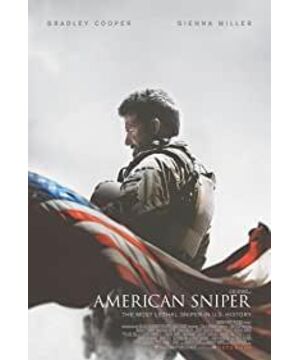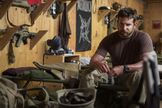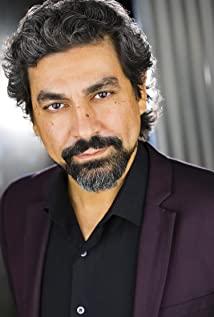American Sniper by Chris Kyle. The American meritorious sniper, a member of the Navy SEALs, during his ten years in Iraq, the official record shot 160 enemy troops, while the unofficial record reached 255. The longest sniper range reached 1920 meters, which is the highest number of confirmed snipers in the United States. By. Unmistakably American hero, but this film is not to show how powerful this person is, how many people he killed, and even I personally feel that the director has deliberately reduced the description of this aspect. Instead, the film focuses more on the trauma of "war" on everyone. In the film, the male protagonist is on the battlefield for the first time, and he sees a woman and a child with an anti-tank grenade trying to attack his teammates from the sniper scope. At the critical moment, the male protagonist pulled the trigger, the bullet passed through the boy's chest, and the thin body fell in a pool of blood. However, the woman next to him chose to pick up the grenade and tried to continue the attack. The male protagonist had to fire another shot. On the first day the male protagonist entered the battlefield, the first murder was women and children. This makes the male protagonist start to think for the first time whether he is doing the right thing. And his teammates persuaded him: "But he may kill ten marines." From that moment on, the male protagonist understood that the purpose of his shooting was just to protect his teammates. As his father always taught him, there are three kinds of people in the world, sheep, wolves, and sheepdogs. The male protagonist has always put himself in the position of the sheepdog who protects the sheep since he was a child. In the following days, the male protagonist covered his teammates many times to complete the task, and his ability was very good. However, on the first time off, when he returned home, the male protagonist was unable to recover from the state of the battlefield and remained highly nervous. Although he could still control it, PTSD had already begun to emerge, and the male protagonist's savior complex , even directly in front of his wife who was about to give birth to say "there is a war in the distance, but no one cares", "I should return to the battlefield". Then the second time on the battlefield, the male protagonist began to hunt down a man named Butcher, but unfortunately the action failed. The male protagonist returned home for the second time off, and his anxiety about leaving the battlefield became more and more serious. The male protagonist began to have slight hallucinations, and at the same time became irritable and irritable. This indifference is not intentional, but a subconscious ignorance that is caused by unrepentance. At this time, the wife could no longer bear the torture, and even said that she hated the male lead and teammates. Although the male protagonist is not angry, his reply is "We can wait, they can't." I think this kind of reply is the most desperate. Although the male protagonist deeply loves his wife and his family, he has never come out of the battlefield. When his teammates began to feel tired of the war, the male protagonist was still hardworking, and it might be a bit too much to enjoy it, but the male protagonist did not feel bored nor complained. At this time, the male protagonist's purpose of shooting himself is still to protect, protect his teammates, protect his country, and fight against terror terrorists. But when his teammates fell in front of him, everything changed. This is a major blow for the male lead. He has been trying to protect his teammates, but still failed. At this time, the male protagonist has another knot in this war - revenge. Get revenge on the sniper who killed your teammate. The third time he came home, his wife was close to collapse, crying and begging him to change back to a flesh and blood person, needing him to be by his side, even threatening him that if he left, he and his children would not be here Wait for him to come back. The male protagonist has no feelings at this time, and he replied calmly, "I want to serve the motherland", "Otherwise my conscience will be disturbed". Facing the bitter pleading of the female protagonist, he ignored it. When he returned to the battlefield again, he found that his former teammates only had one choice to come back. Others are either tedious, opted out, or dead. In the task of protecting the engineer wall, the male protagonist finally found an opportunity to hunt enemy snipers, 2100 yards, more than a mile, and a long distance. Even if his peers thought it was not feasible, the male protagonist still fired that shot without hesitation. He knew the shot was going to hit because it was for his brother. Sure enough, gunshots rang out, and people died. But this also exposed the position of the male protagonist and his party. They were besieged by the enemy and once applied for bombing to avoid being humiliated by the enemy. Between life and death, the male protagonist called his wife and cried that he was ready to go home. In fact, here is the male protagonist letting go of his heart. Just because of the sandstorm, the helicopter missed the shot. Thanks to the sandstorm, the male protagonist and his party were able to escape from the dangerous zone and survived successfully. So far, after a round of life and death, the male protagonist finally left the battlefield and returned to China. But the story is still not over, and the male protagonist finds it difficult to integrate into his normal daily life. Accustomed to the high-pressure state of the battlefield, he always stared at everyone with alert eyes, checking over and over whether they were a threat. As for when he was alone, the sound of guns lingered in his ears forever, and scenes of war flashed in his eyes from time to time. He couldn't calm down. Until he went to the hospital to see a psychiatrist. "I'm just protecting myself" "I have a clear conscience for every life I take" "It's the people I didn't save that hurt me" "I would and could go back and protect them, but I didn't" "I came back Now, retired." Here the male protagonist's savior complex is infinitely enlarged. So in order to help him, the doctor asked him to help the veterans who were hurt by the war. By helping them, the male protagonist gradually gained a kind of self-redemption. The video here does not describe the inner activities of the male protagonist, but I guess that helping these people can be regarded as satisfying him. The savior complex, and alleviating his regret for not being able to continue serving to "save people". However, this also paved the way for the final murder of the male lead. He was shot and killed while helping a retired veteran with psychological problems. The whole story, just from the standpoint of Chris Kyle's country, he is a noble man, almost a saint. He did his best to serve the country, protect his teammates, and did so much for it. Especially since he felt guilty for not saving more people, which is almost something a saint has. However, the irony of the whole story is that his enemy failed to kill him. What killed him was what he had been trying to protect, tried to help, and should have also protected his "comrades". This casts a tragic overtone to the whole story. But if we get out of it, we can clearly feel the harm that war has done to a person. Not to mention the dead, people are already dead, this is the greatest harm, and the living are not easy. Various mental illnesses, such as PTSD, may accompany those who experience war for a lifetime. It is not easy for the male protagonist to be able to struggle out of it and still have a happy and happy family, but the way he died in the end is embarrassing. None of this would have happened if there had been no war. So in the final analysis, war between human beings is always evil. This sentence should be written into textbooks.
View more about American Sniper reviews











